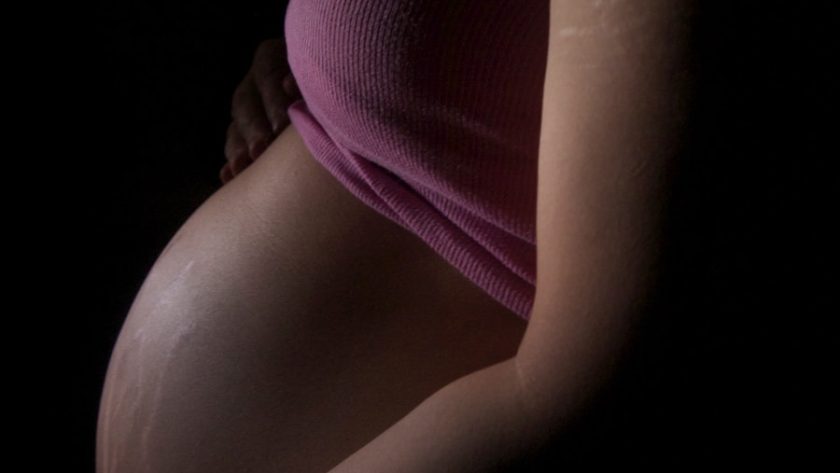It is not a foolish thing to struggle with acne, stretch marks, or other skin issues. Why aren’t more people doing what they can to help?
Samantha Terry now has red stretch marks covering her midsection after giving birth to her children. They run from her thighs to her belly button. They run along her hips and waist. She says it looks like she was scratched by an ibex.
Sometimes she doesn’t mind them at all. It is a small price to pay for her two children, whom she loves more than anything. Sometimes she feels embarrassed and “gross”. She’s tried to bring the subject up to some older women she knows but was immediately stopped by her mother.

Terry said, “It would be nice to be in a position to discuss it more. Now it makes you feel guilty about complaining.”
During pregnancy, and afterwards, the body experiences a lot of changes. This includes changes in their skin. Estimates suggest that up to 90% of expectant women get stretch marks. Up to 50% of women experience melasma, or the development of brown or blue-gray patches on their face, cheeks or arms. More than 50% develop acne – and there are more skin issues that arise, like varicose veins, hair loss, eczema flareups, and on and on.
Some of these changes are temporary. Others can last a lifetime. A woman can feel emotional distress from any of these issues. People who are pregnant often don’t feel that there’s anything they can do or anyone they can speak to about their feelings.
A Study Area of Pregnancy and Postpartum that isn’t being Studied
Doctors have started to recognize the psychological and physical effects that certain skin conditions can have over the past 10 years. For example, studies have shown that severe acne can lead to suicidal thoughts. There has been a push to create a more integrated system for care that includes dermatologists and mental healthcare professionals to better understand the effects of hormones and stress on skin.
For those who have given birth, however, the link between skin and mental health has often been overlooked. Frank Wang, a Michigan Medicine dermatologist and one of few researchers who has studied stretch marks specifically, said that there is very little information on the psychological and emotional effects of stretch marks.
His team recently released results from a small study of 100 post-partum women. They found that one-third of those with stretch marks experienced either “a lot” or “moderate” embarrassment. This embarrassment made it difficult for them to wear certain clothes and participate in some social activities. It also affected their self-esteem.
Many women don’t worry about skin changes while pregnant. Some even treasure them. Wang believes that it is important for researchers and clinicians to work with pregnant women to identify ways to help those who feel insecure and address both their practical concerns and the emotions they bring up.
“Everything in medicine is always individual. We live in a great age, where we are taught to accept the things that we have… which is a positive thing in many ways.” He said that he believes there are people who are extremely distressed about their skin conditions. Although a skin disorder isn’t necessarily life-threatening it can have a profound impact on how people feel about themselves, and the quality of their lives.
What we can do to support people after pregnancy?
Theresa was 31 when she had her stretch marks. However, they weren’t a major source of stress for her. The severe acne under her breasts during pregnancy eventually led to cysts. These cysts burst while she was nursing her daughter, and are now permanent scars.
She spoke to her doctor at that time but was not given any advice on managing the cysts. The only conversation she had at that time with a close friend was not a good one. A family member noticed her cysts while she was nursing her baby in the NICU and asked if they were making her breast milk unsafe.
Theresa stated that the experience was very difficult for her mentally and emotionally. She also said that her scars were still a source to insecurity, especially during sex.
There isn’t much doctors can help with some conditions that arise during pregnancy or after. This is a problem in better dealing with these issues. Wang is trying to understand the causes of stretch marks and how they can be treated, but there aren’t many evidence-based treatments or ways to prevent them. This is true for issues such as melasma or treating acne during pregnancy, when many commonly used medications can be dangerous.
There are many ways that women can be supported emotionally.
“What happens is that even if a woman says, “This is really bothering me, I feel insecure,” they are told, “Oh, but you have happy, healthy babies.” These other things should be your focus ,'” says Paige Bellenbaum is the founder of The Motherhood Center’s mental health clinic in New York City. These issues are often deemed “unimportant” or even “peripheral” by women, she said.
Postpartum women are bombarded with mixed messages about how to look and feel. They are bombarded with images of “bounce back” moms and marketing campaigns that exploit the body-positivity movement, encouraging them to embrace their changes with calm and pure positivity. They are told repeatedly that they should be grateful to their moms, but not in explicit ways.
Bellenbaum stated that women should be allowed to speak freely about their struggles.
Bellenbaum stated that a different way to respond when someone brings attention to how they feel during pregnancy or afterwards is to make space for it and be curious. “Like, tell me more about that feeling” instead of telling someone they shouldn’t feel that way.





